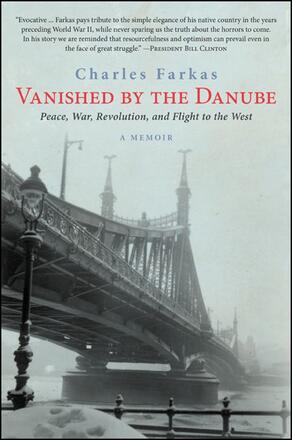
Vanished by the Danube
Peace, War, Revolution, and Flight to the West
Alternative formats available from:
A story of loss and survival.
Description
Germany's invasion of Hungary in 1944 marked the end of a culture that had dominated Central Europe from the nineteenth century to the middle of the twentieth. In this poignant memoir, Charles Farkas offers a testament to this vanished way of life—its society, morality, personal integrity, wealth, traditions, and chivalry—as well as an eyewitness account of its destruction, begun at the hands of the Nazis and then completed under the heel of Soviet Communism. Farkas's recollections of growing up in Budapest, a city whose grandeur embraced—indeed spanned—the Danube River; his vivid descriptions of everyday life in Hungary before, during, and after World War II; and his ultimate flight to freedom in the United States remind us that behind the larger historical events of the past century are the stories of the individual men and women who endured and, ultimately, survived them.
Charles Farkas was born in 1925 in Budapest, Hungary. In 1949, he earned a double doctorate in law and political science from the University of Pázmány Péter. After the failure of the 1956 Hungarian uprising, Farkas fled to the United States, where he received a master's in library science from Columbia University. He went on to become director of the Briarcliff Manor Public Library, where he worked from 1968 until his retirement in 1996. He and his wife, Edit, live in Chappaqua, New York. They have four children and, as of early 2013, four grandchildren.
Reviews
"Charles Farkas has written his life story not as a Hungarian, but as a Hungarian American, which is to say that his memoir Vanished by the Danube is a kind of farewell to all that he and his family lost, but he is neither bitter nor mournful … This is the story of a lost world, but this is also a story about survival. " — from the Introduction by Margaret McMullan
"…Vanished by the Danube is detailed, self-assured, and precise … The author's superb recollections from personal memory are accompanied by many photographs and other visual materials. " — Hungarian Cultural Studies
"This memoir is like a photo album of images from Farkas' life arrayed alongside all the contextual details of the four decades of Hungarian history the author covers … what makes his account interesting is the incredible detail with which he relates events, down to the food served, the songs played, and the jokes told at parties. " — Foreign Affairs
"Written with an impeccable memory for detail, and with excellent and interesting vignettes and anecdotes, along with a conscious sensitivity to the interests of the reader, Vanished by the Danube is a thoughtful, brilliantly written tribute. Farkas' love for his family and his vanished homeland is always evident but never veers into sentimentality. He carefully paints 'what was' so the contrast with 'what became' is even more garish and traumatic. Readers cannot help but be moved by his love and his loss. " — San Francisco Book Review
"[Farkas's] tales of adventure and hardship are set against the looming shadow of war in precise, careful prose … [his] memoir is a dear and thorough effort to give life again to those turbulent years, to animate his old ghosts. In a way, it is his return home. " — Los Angeles Review of Books
"In his evocative new memoir, Vanished by the Danube, Charles Farkas walks us gracefully through the Hungary of his youth. Through stories that extract beauty from everyday events, Farkas pays tribute to the simple elegance of his native country in the years preceding World War II, while never sparing us the truth about the horrors to come. In his story we are reminded that resourcefulness and optimism can prevail even in the face of great struggle. " — President Bill Clinton
"This is an important addition to the history of one of the most violent chapters of the twentieth century, told by an eyewitness. Charles Farkas brings back those nightmare years at a crucial moment for Europe. We ignore their lessons at our peril. " — Kati Marton, author of Paris: A Love Story
"An extraordinary life, extraordinarily well told. " — Thomas Dunne, Publisher and Editor, Thomas Dunne Books
"The great British-Hungarian author Arthur Koestler liked to tell of a conversation he had with an English journalist: 'Oh, Mr. Koestler'—the journalist exclaimed—'you have had a very colorful life. ' 'No'—the author answered—'it was only an East European life. ' The statement greatly applies to Charles Farkas's autobiography: willy-nilly, he too underwent many adventures, some good, some bad, but he always tells them with good humor and a profound understanding of human foibles. There is also great sympathy for the persecuted and the weak. All this is based on what seems to be a perfect recall of far-away events. The story relates more than just the disappearance of old social classes; it also recounts what can happen to a small country, Hungary, when squeezed between two imperialist powers. " — István Deák, author of The Lawful Revolution: Louis Kossuth and the Hungarians, 1848–1849